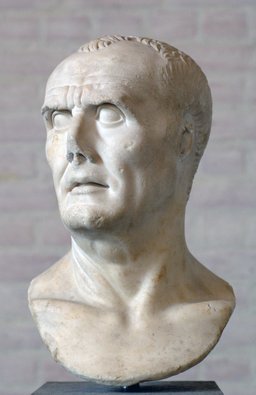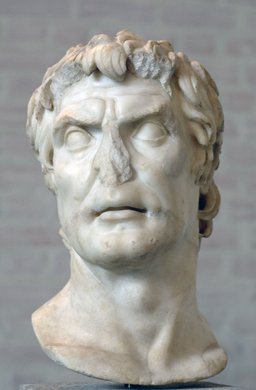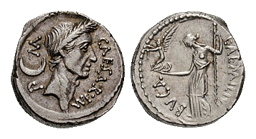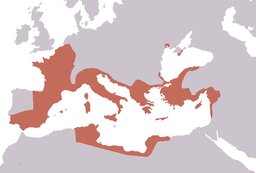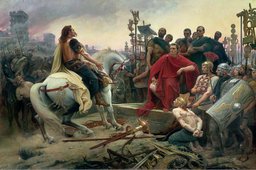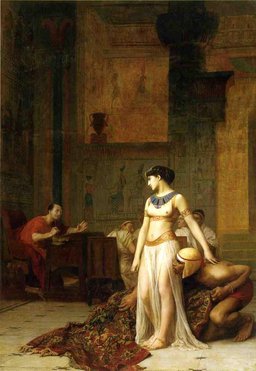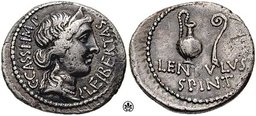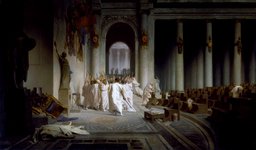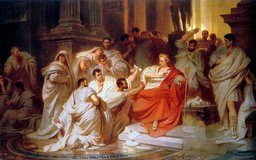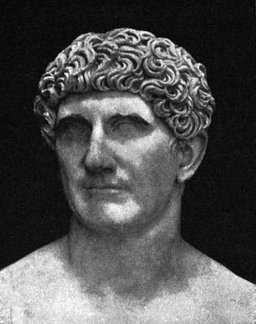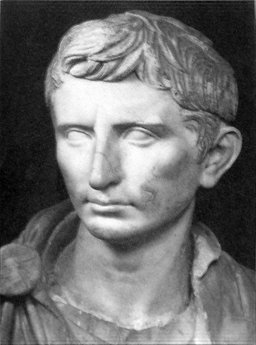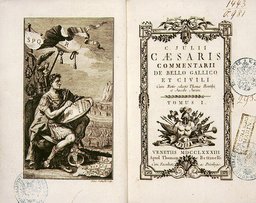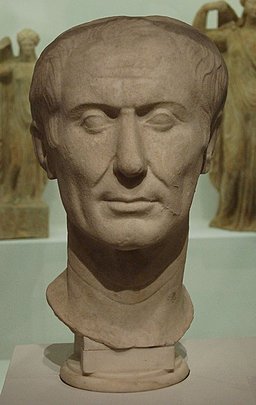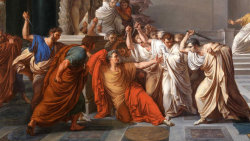Julius Caesar
Julius Caesar
| Dictatorof theRoman Republic | |
|---|---|
| October 49 BC – 15 March 44 BC | |
| Consulof theRoman Republic | |
| 1 January 44 BC – 15 March 44 BC Serving withMark Antony | |
| C. Caninius Rebilus(Suffect) andGaius Trebonius(Suffect) | |
| P. Cornelius Dolabella(Suffect) andMark Antony | |
| 1 January 46 BC – September 45 BC Serving withM. Aemilius Lepidus(46 BC) | |
| Q. Fufius CalenusandPublius Vatinius | |
| Q. Fabius Maximus(Suffect) andGaius Trebonius(Suffect) | |
| 1 January 48 BC – 1 January 47 BC Serving withP. Servilius Vatia Isauricus | |
| C. Claudius Marcellus MaiorandL. Cornelius Lentulus Crus | |
| Q. Fufius CalenusandPublius Vatinius | |
| 1 January 59 BC – 1 January 58 BC Serving withMarcus Calpurnius Bibulus | |
| Q. Caecilius Metellus CelerandLucius Afranius | |
| L. Calpurnius Piso CaesoninusandAulus Gabinius | |
| Personal details | |
| Born | 13 July 100 BCRome |
| Died | 15 March 44 BC (aged 55) Rome |
| Resting place | Temple of Caesar, Rome |
| Political party | Populares |
| Spouse(s) | |
| Children | |
| Parents | Gaius Julius CaesarandAurelia Cotta |
| Religion | Roman polytheism |
Caesarius of Terracina, the saint who has Christianized the cult of Julius Caesar
The statesman and generalGaius Julius Caesar [152] (100-44 B.C.) expanded the Roman Republic through a series of battles across Europe before declaring himself dictator for life. He died famously on the steps of the Senate at the hands of political rivals. Julius Caesar is often remembered as one of the greatest military minds in history and credited with laying the foundation for the Roman Empire. Gaius Julius Caesar, one of the world’s greatest military leaders, was born into a senatorial, Patrician family and was the nephew of another famous Roman general, Marius. After the death of Marius and the rise of Sulla, Caesar’s life was for a time in jeopardy, but in the early 60's B.C.E he launched his own successful political and military career. Rising rapidly, he campaigned successfully for the Consulship in 60 B.C.E. and struck a deal with two of Rome’s leading figures, Pompey the Great [1] and Crassus. Together the three of them became known as the First Triumvirate and controlled Rome throughout the 50's B.C.E. until Caesar and Pompey, after Crassus’s death, went to war against one another in 49 b.c. During the heyday of the First Triumvirate, Caesar devoted his energies to the conquest of Gaul (modern France). After serving as consul in 59 b.c., Caesar became governor of Cisalpine and Transalpine Gaul (northern Italy and southern France, respectively). In 58, when the Helvetii in Switzerland attempted to migrate into central Gaul, Caesar decided that they would be a threat to the Roman province, and in a great battle he stopped their advance and sent them back into their homeland. In the meantime he had become friendly with the chieftains of central Gaul, and they urged him to protect them against a German invader from across the Rhine, Ariovistus. So, in the summer of 58, after defeating the Helvetians, Caesar marched against the Germans and drove them out of Gaul. Caesar was by then inextricably involved in the affairs of Gaul. Over the next several years, in a series of brilliant campaigns, the Roman general conquered all of Gaul and made it a Roman province. The conquest required several difficult battles in northern Gaul and the crossing of the Rhine over a trestle bridge constructed by Roman engineers. In the summers of 55 and 54 B.C.E., Caesar sailed across the English Channel, thereby securing his northern flank along the Rhine in Gaul by precluding a Celtic attack from across the Channel, though Britain did not become a Roman province for another hundred years. After dealing with a major revolt by Gallic chieftains, including Caesar’s famous siege of Vercingetorix’s bastion at Alesia in 52 B.C.E., the Roman leader brought resistance to an end in 51 and 50 b.c. Early in 49, as his command in Gaul was coming to an end, Caesar began civil war with his old associate, Pompey the Great, who had allied himself with the Roman Senate against Caesar. In a surprising blitzkrieg, Caesar invaded Italy and drove Pompey into Macedonia in less than seventy days. Since Pompey had a fleet and Caesar did not, Caesar decided to attack Spain, where Pompey had strong support, while Caesar’s men constructed warships. Victorious in Spain, Caesar then sailed to Macedonia, but he could not dislodge Pompey from his base at Dyrrhachium (modern Durazzo). Caesar finally raised the siege, fell back into central Greece, and defeated Pompey, who had pursued him, at the Battle of Pharsalus in 48 B.C.E. Caesar was then drawn into an affair with Cleopatra in Egypt and finally had to fight two more battles with the Pompeians, one in North Africa (Thapsus, 46 B.C.E.) and another in Spain (Munda, 45 B.C.E.). Triumphant all over the Mediterranean, the great general was assassinated by political rivals on the Ides of March in 44 B.C.E., as he prepared an invasion of the Parthian Empire. His generalship was characterized by boldness, decisiveness, and a sometimes reckless willingness to move ahead of his supply lines. [49] [84] [25]
| Dictatorof theRoman Republic | |
|---|---|
| October 49 BC – 15 March 44 BC | |
| Consulof theRoman Republic | |
| 1 January 44 BC – 15 March 44 BC Serving withMark Antony | |
| C. Caninius Rebilus(Suffect) andGaius Trebonius(Suffect) | |
| P. Cornelius Dolabella(Suffect) andMark Antony | |
| 1 January 46 BC – September 45 BC Serving withM. Aemilius Lepidus(46 BC) | |
| Q. Fufius CalenusandPublius Vatinius | |
| Q. Fabius Maximus(Suffect) andGaius Trebonius(Suffect) | |
| 1 January 48 BC – 1 January 47 BC Serving withP. Servilius Vatia Isauricus | |
| C. Claudius Marcellus MaiorandL. Cornelius Lentulus Crus | |
| Q. Fufius CalenusandPublius Vatinius | |
| 1 January 59 BC – 1 January 58 BC Serving withMarcus Calpurnius Bibulus | |
| Q. Caecilius Metellus CelerandLucius Afranius | |
| L. Calpurnius Piso CaesoninusandAulus Gabinius | |
| Personal details | |
| Born | 13 July 100 BCRome |
| Died | 15 March 44 BC (aged 55) Rome |
| Resting place | Temple of Caesar, Rome |
| Political party | Populares |
| Spouse(s) | |
| Children | |
| Parents | Gaius Julius CaesarandAurelia Cotta |
| Religion | Roman polytheism |
